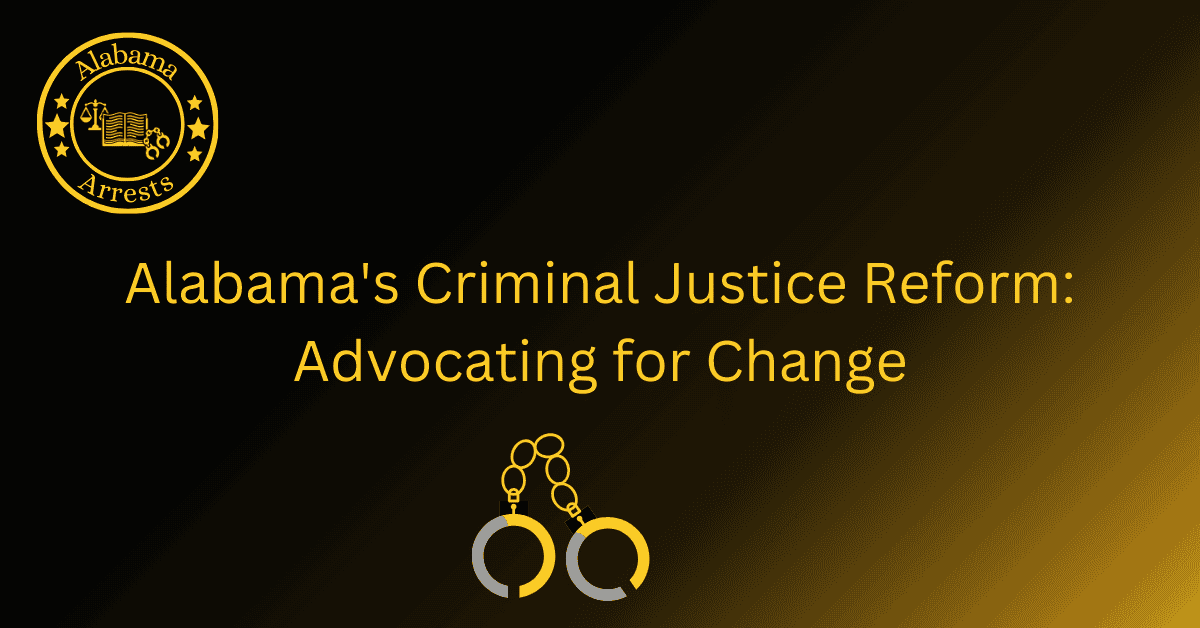Alabama’s Criminal Justice Reform: Advocating for Change
In recent years, the state of Alabama has been at the forefront of a nationwide movement to reform its criminal justice system. With a focus on reducing recidivism rates and promoting rehabilitation, Alabama’s leaders have recognized the need for change and have taken bold steps to address the issues plaguing the current system. Through innovative programs and policies, they are paving the way for a more just and equitable future.
One of the key pillars of Alabama’s criminal justice reform efforts is the promotion of alternative sentencing options. Rather than relying solely on incarceration, the state is investing in diversion programs that provide individuals with the opportunity to address the root causes of their criminal behavior. By offering substance abuse treatment, mental health services, and job training, Alabama is not only reducing the burden on its overcrowded prisons but also giving individuals a chance to turn their lives around.
Investing in Rehabilitation
Alabama understands that true criminal justice reform goes beyond punishment and incarceration. The state recognizes the importance of rehabilitation in breaking the cycle of crime. By investing in rehabilitation programs, Alabama is giving individuals the tools they need to reintegrate into society and become productive, law-abiding citizens.
Addressing Substance Abuse
Substance abuse is a significant factor in many criminal behaviors. Alabama’s criminal justice reform efforts focus on addressing this issue head-on. Through comprehensive substance abuse treatment programs, individuals can receive the support and guidance they need to overcome addiction and rebuild their lives.
Supporting Mental Health
Mental health is another critical aspect of the criminal justice system that Alabama is prioritizing. By offering mental health services to individuals involved in the justice system, the state aims to address the underlying issues that contribute to criminal behavior. Through therapy, counseling, and access to medication, Alabama is ensuring that mental health is not overlooked in the pursuit of justice.
Building Job Skills
One of the biggest challenges individuals face after being involved in the criminal justice system is finding stable employment. Alabama recognizes this barrier and is actively working to provide job training and skills development opportunities. By equipping individuals with marketable skills, the state is increasing their chances of finding meaningful employment and reducing the likelihood of reoffending.
Restoring Voting Rights
Alabama is committed to restoring the rights and dignity of individuals who have paid their debt to society. The state has implemented policies to restore voting rights for individuals with past convictions, recognizing that civic participation is an essential part of successful reintegration. By allowing individuals to participate in the democratic process, Alabama is promoting a sense of belonging and encouraging a positive future.
Collaborating with Community Organizations
Alabama’s criminal justice reform efforts are not carried out in isolation. The state recognizes the value of collaboration with community organizations that are dedicated to supporting individuals involved in the justice system. By partnering with nonprofits, faith-based organizations, and other community groups, Alabama is leveraging their expertise and resources to create a holistic approach to reform.
Measuring Success and Continuing Progress
Alabama understands that true reform is an ongoing process. The state is committed to measuring the success of its initiatives and making adjustments as needed. By continuously evaluating the impact of their policies and programs, Alabama can ensure that its criminal justice system is fair, effective, and equitable for all individuals involved.
FAQs
What is Alabama’s Criminal Justice Reform?
Alabama’s Criminal Justice Reform is a comprehensive effort to improve the state’s criminal justice system by implementing evidence-based policies and practices that aim to reduce crime rates, enhance public safety, and ensure fair and effective sentencing.
Why is criminal justice reform important in Alabama?
Criminal justice reform is crucial in Alabama to address the issues of overcrowded prisons, high incarceration rates, and racial disparities within the system. By advocating for change, Alabama aims to create a more equitable and efficient criminal justice system that focuses on rehabilitation and reducing recidivism.
What are the key goals of Alabama’s Criminal Justice Reform?
The key goals of Alabama’s Criminal Justice Reform are to reduce the state’s prison population, improve community supervision and reentry programs, address substance abuse and mental health issues, eliminate racial disparities, and enhance public safety through evidence-based practices.
How does Alabama’s Criminal Justice Reform address overcrowded prisons?
Alabama’s Criminal Justice Reform tackles overcrowding by implementing alternative sentencing options, such as diversion programs and specialty courts, for non-violent offenders. It also focuses on expanding community-based supervision and rehabilitation programs to reduce the reliance on incarceration.
What steps are being taken to address racial disparities in Alabama’s Criminal Justice System?
Alabama’s Criminal Justice Reform is actively working to address racial disparities by promoting fairness and equality within the system. This includes implementing policies that reduce bias in policing, promoting cultural competency training, and ensuring equal access to justice for all individuals, regardless of race or ethnicity.
How can I get involved in advocating for criminal justice reform in Alabama?
You can get involved in advocating for criminal justice reform in Alabama by joining local advocacy groups, attending community meetings and public hearings, contacting your elected representatives, and staying informed about the latest developments and initiatives related to criminal justice reform in the state.







